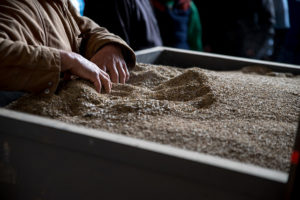
Oregon seed growers need you. Do you have two minutes to take action and help protect organic seed in the Willamette Valley?
The Oregon Department of Agriculture (ODA) is proposing to greatly expand the area available for canola production in the Willamette Valley, leaving much of this prime seed growing region, and the organic specialty seed farms who have operated there for decades, unprotected. Thankfully, a bill that aims to keep protections in place for specialty seed growers is moving through the state legislature, but its success is uncertain.
The Oregon State Legislature is considering a bill, SB885, which would keep in place protections for specialty crop seed – including organic seed – producers. These protections are needed in the face of ongoing pressure to allow canola production throughout the Willamette Valley, a first-class seed growing region that has earned a reputation for delivering high-quality seed to farmers and gardeners around the globe.
Allowing canola production in the Willamette Valley would lead to an increase in pest, disease, and weed pressures associated with Brassica production. The vast majority of these production problems, such as increased disease, will be handled with chemical sprays, an added threat to organic specialty seed growers in the region. There are also no current restrictions on growing genetically engineered (GE) canola, which can cross-pollinate with other brassica crops, increasing genetic testing costs for organic and other non-GE brassica growers.
For three decades specialty seed growers have been protected by a pinning system, isolation distances, and restrictions on growing canola in certain areas and beyond a certain amount of acreage. And now that’s in jeopardy.
Take action today
1. If you live in Oregon, please contact your state senator today.
Urge them to support and pass SB885. The bill will be on the Senate floor any day now.
Tell your state senator that SB885 is necessary because the ODA’s proposed rule does not protect specialty seed growers, including organic seed growers. SB885 would ensure that current restrictions on canola production in the Willamette Valley remain, giving Oregon’s growers a better chance at fulfilling the demand for specialty seed that farmers, gardeners, and eaters around the world rely on from this region.
2. Contact the Oregon Department of Agriculture by June 21
You can also submit a comment to the ODA about their inadequate rule by June 21 at 5p.
Via email: ssummers@oda.state.or.us Or by mail: Sunny Summers, Oregon Department of Agriculture, 635 Capitol St. NE, Salem, OR 97301. Here are some talking points from our friends at Adaptive Seeds:
- The proposed rule is insufficient because it does not require industry-recommended isolation distances between Brassica producers.
- It does not prohibit genetically engineered, herbicide-resistant canola varieties.
- The burden of cross-pollination problems fall solely on the specialty seed industry.
- Oilseed producers are permitted to more or less grow as much as they want wherever they want outside of the Proposed Isolation Area.
- It threatens the viability of Oregon’s unique specialty seed industry that provides Brassica seed to farmers worldwide.
- It does not limit the amount of canola acreage to prevent an increase in the presence of Brassica specific diseases, pests, etc.


